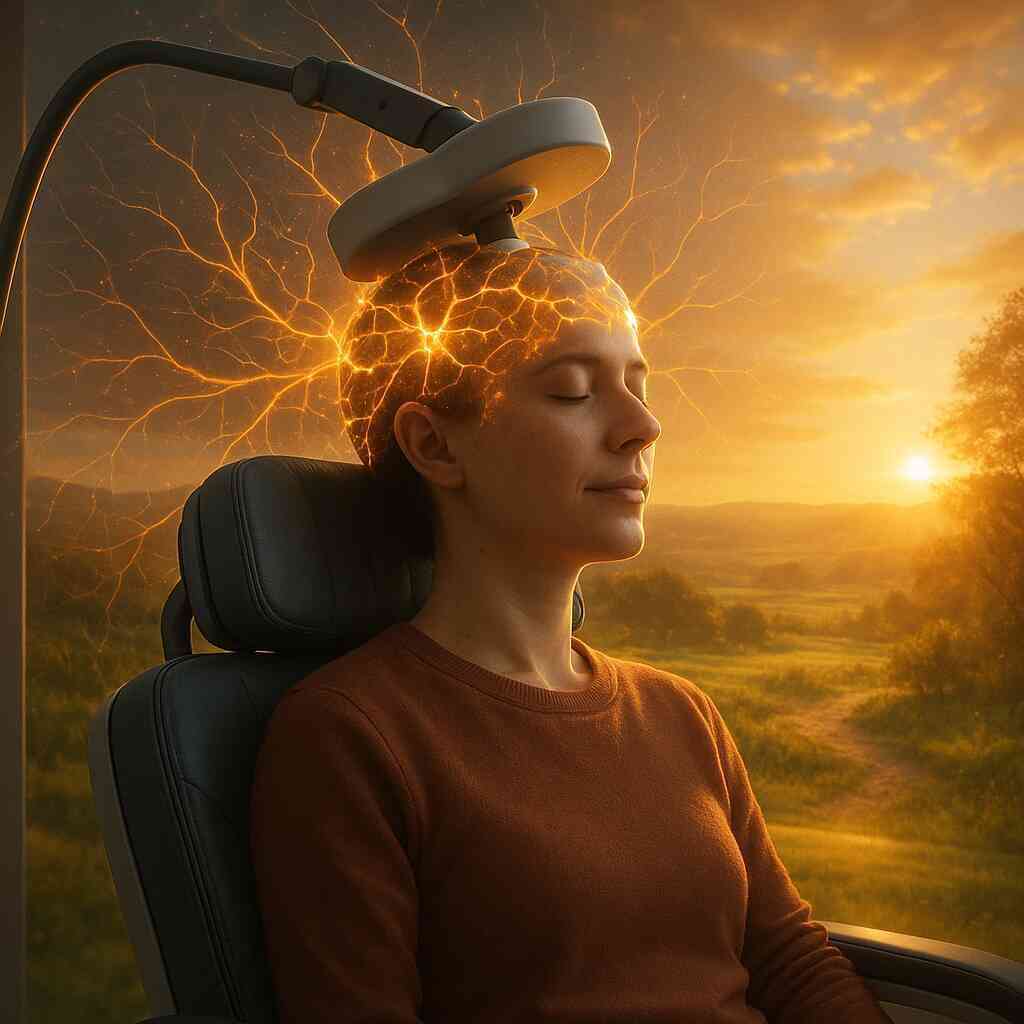
Comparing TMS and Ketamine for OCD at TMS Treatment
Unlocking the Mysteries of OCD: A Complex Puzzle
Understanding OCD: Beyond the Surface
Obsessive-Compulsive Disorder, commonly known as OCD, is often misunderstood by many. It extends beyond the stereotypes of excessive cleanliness or repetitive behavior. At its core, OCD is characterized by persistent, unwanted thoughts and repetitive behaviors. These obsessions and compulsions can significantly disrupt daily life. It’s crucial to grasp the complex nature of OCD to understand the challenges faced by those living with the disorder. A deep dive into this condition reveals that it affects not just the mind but also impacts emotional and social well-being. As we explore treatments like TMS treatment options for OCD, recognizing the depth of OCD is essential.
The Neuroscience of Obsessive-Compulsive Disorder
OCD is deeply rooted in the brain’s neurobiology, implicating various neural networks. The disorder involves anomalies in cortico-striato-thalamo-cortical circuits, affecting how the brain processes instructions and prioritizes actions. Neuroimaging studies have shown irregular activity in regions like the orbitofrontal cortex, contributing to the obsessive thoughts that plague OCD sufferers. Understanding the brain’s role in OCD is pivotal for crafting effective treatments. This scientific insight forms the foundation for advanced therapies, such as Neurostimulation technology, which target these specific areas to alleviate symptoms.
Impacts on Quality of Life and Mental Health
Living with OCD can profoundly impact an individual’s quality of life. The relentless obsessions and compulsions can lead to significant stress, impairing both personal and professional relationships. This disorder often coexists with other mental health issues such as depression and anxiety, further complicating treatment efforts. The chronic nature of OCD requires ongoing management, making it a long-term battle for many. Yet, innovative treatments, including exploring innovative TMS therapy, offer hope for reclaiming one’s quality of life. By addressing the underlying neurological disruptions, such treatments aim to enhance overall mental health and well-being.
Harnessing Innovation: The Science Behind TMS Therapy
How Transcranial Magnetic Stimulation Works
Transcranial Magnetic Stimulation (TMS) is a groundbreaking advancement in the field of mental health treatment, offering a non-invasive method to address disorders like OCD. By utilizing electromagnetic fields, TMS selectively targets and stimulates nerve cells in brain regions implicated in mental disorders. This approach helps modulate neural pathways and restore normal activity levels. Understanding transcranial magnetic stimulation serves as the foundation for treating complex conditions, providing an innovative solution for those in need of relief. The precision and efficacy of TMS lie in its ability to influence brain circuits without the side effects typically associated with medications.
TMS Effectiveness for OCD: Evidence and Case Studies
Extensive research demonstrates the significant impact of TMS therapy on individuals suffering from OCD. Clinical studies highlight the therapy’s success in reducing symptoms and improving the quality of life for patients. The effectiveness of TMS is evident in numerous case studies where patients have experienced substantial symptom relief after undergoing treatment. These success stories provide hope and verify the potential of TMS therapy as a powerful modality for OCD recovery. At TMS Treatment Florida, results-oriented approaches ensure patients receive optimal outcomes, reinforcing TMS therapy effectiveness for mood disorders.
Non-invasive Treatment Options: A Safer Solution for OCD
One of the standout benefits of TMS therapy is its non-invasive nature, making it a safer choice compared to traditional treatments. This therapy eliminates the need for anesthesia or recovery time, allowing patients to resume their daily activities immediately after sessions. With minimal side effects, TMS offers a gentler alternative for individuals seeking relief from OCD symptoms. The non-invasive aspect of TMS significantly reduces health risks, providing an innovative treatment path without the complications often associated with other interventions. Patients at TMS Treatment Florida can benefit from personalized mental health solutions in Florida, ensuring their safety and well-being are prioritized.
Cutting-edge TMS Technology and Its Implications
TMS therapy represents the pinnacle of technological advancement in mental health care. Innovations in TMS equipment and techniques continue to refine and enhance treatment efficacy. This cutting-edge technology provides a targeted approach, ensuring stimulation of specific brain regions involved in OCD. The implications of TMS extend beyond symptom management, offering long-term benefits for patients. Advances in TMS technology result in more precise treatments, improving both the immediate and sustained outcomes for OCD sufferers. Insights into neurostimulation advancements propel TMS therapy forward, setting new standards for therapeutic efficacy.
Personalized Mental Health Treatments at TMS Treatment Florida
At TMS Treatment Florida, personalized treatment plans are at the core of their therapeutic approach. Understanding that each patient’s experience with OCD is unique, the clinic offers tailored solutions to address individual needs. A comprehensive assessment ensures treatments are customized, optimizing the chances of recovery and mental wellness. By leveraging the expertise of mental health professionals and cutting-edge technology, TMS Treatment Florida creates an environment conducive to transformative healing. Patients are empowered on their journey to recovery through advanced TMS therapy for OCD recovery, harnessing the potential of personalized mental health care.

The Power of Ketamine: Shedding Light on a Controversial Treatment
Ketamine Infusion Therapy: Clinical Perspectives
Ketamine infusion therapy is revolutionizing the landscape of mental health treatments. This novel approach, historically utilized as an anesthetic, is gaining traction for its rapid alleviation of severe depressive symptoms. In clinical settings, ketamine is administered in controlled, low doses, targeting NMDA receptors in the brain, which are linked to mood disorders. The immediacy of ketamine’s effects sets it apart from conventional treatments, offering relief where traditional antidepressants have failed. Despite its promise, ketamine therapy remains a subject of debate due to concerns over long-term safety and potential misuse. Therefore, clinical oversight is critical to harness its therapeutic potential safely.
Ketamine Effectiveness for OCD: Insights and Observations
Research into ketamine’s effectiveness for OCD reveals promising insights. Patients undergoing ketamine therapy have reported significant reductions in obsessive-compulsive symptoms shortly after treatment. This rapid response contrasts starkly with the prolonged timeframe required to gauge the efficacy of standard OCD medications. Observational studies suggest that ketamine’s unique impact on glutamate neurotransmission may play a crucial role in alleviating OCD symptoms. However, continued research is necessary to understand the optimal dosing, duration, and long-term outcomes of ketamine treatment for OCD. In Florida, ketamine is emerging as a valuable alternative, especially for individuals unresponsive to other treatments.
The Role of Ketamine in Mood Disorder Treatments
The role of ketamine in mood disorder treatments underscores its transformative potential. Ketamine’s rapid action can be life-changing, particularly for those battling treatment-resistant depression. In South Florida, ketamine therapy solutions are increasingly being integrated into comprehensive mental health care plans. By altering neural communication pathways, ketamine offers a new avenue for managing complex mood disorders. Despite its benefits, ketamine’s use demands caution and expert administration to maximize efficacy while minimizing risks. Continued exploration of the role of ketamine in mood disorder treatment aligns with the shift towards personalized mental health interventions.
Ketamine Clinics for OCD in Florida: An Overview
Ketamine clinics in Florida are paving the way for innovative OCD treatments. These specialized centers provide state-of-the-art facilities where experienced professionals administer ketamine infusions in a controlled environment. With a focus on safety and efficacy, Florida’s ketamine clinics are at the forefront of addressing OCD with unconventional strategies. By offering cutting-edge care, these clinics play a pivotal role in expanding access to alternative treatment options across the state. For those interested in exploring these solutions, ketamine treatment clinics for OCD in Florida represent a significant step forward in therapeutic advancements, heralding a new era in mental health care.
TMS vs. Ketamine: A Comparative Exploration
TMS Versus Ketamine for OCD: Analyzing Therapeutic Efficacy
In the realm of OCD treatment, evaluating the efficacy of TMS versus Ketamine underscores significant therapeutic insights. Transcranial Magnetic Stimulation (TMS) operates on the principle of modulating neural circuits through electromagnetic stimulation. It presents a stable improvement in OCD symptoms with its lasting effects. Meanwhile, Ketamine infusion rapidly alters neurotransmission, offering immediate relief, particularly for those resistant to traditional therapies. Analyzing their therapeutic impacts reveals that while both treatments offer symptomatic relief, the route and duration of relief substantially differ, offering patients diverse options for mental wellness. For more insights into this comparison, explore our analysis on TMS versus Ketamine in mental health care.
Innovative Mental Health Therapies for Long-term OCD Recovery
For patients seeking long-term recovery from OCD, innovative therapies like TMS and Ketamine provide unique routes. TMS therapy is celebrated for its non-invasive and sustainable outcomes. It focuses on rewiring brain circuits over time, thus decreasing obsessive-compulsive tendencies without the harsh side effects of medication. Conversely, Ketamine therapy offers a quick fix with potential for immediate mood enhancements, though it requires careful monitoring to maintain effects. Each treatment has its unique strengths, making them formidable tools in fostering prolonged recovery for OCD patients. These diverse approaches illustrate the evolving landscape of mental health care, where personalized strategies lead to robust outcomes.
Economics and Accessibility: Treatment Costs and Insurance Considerations
Understanding the economics of treatment options, including TMS and Ketamine, is crucial for accessibility. Both therapies present distinct financial implications. Insurance coverage for TMS is becoming more common, expanding its accessibility. The cost of Ketamine, however, often necessitates out-of-pocket expenses, limiting its reach despite its potential benefits. As patients navigate their mental health journey, weighing these economic factors alongside therapeutic outcomes is essential. A detailed analysis of the Economics of OCD treatment options provides further insights into these considerations, empowering patients to make informed decisions.
Patient Experiences: Reclaiming Life with TMS and Ketamine
Ultimately, patient experiences are the cornerstone of evaluating TMS and Ketamine’s impact. Many individuals have reclaimed their lives through these therapies, narrating transformations marked by reduced symptoms and enhanced daily functioning. TMS’s gradual yet sustainable improvement contrasts with Ketamine’s swift, profound effects, highlighting the necessity for personalized treatment plans. Personal testimonials underscore the life-changing potential these therapies hold, forging paths to recovery where traditional methods have faltered. As individuals embrace these advanced treatments, they not only recover but also thrive, captivating the true essence of mental health resilience.

Conclusion: Navigating the Path to Mental Wellness
Advanced OCD Treatment Methods: Embracing the Future
The landscape of OCD treatment is undergoing a transformative shift, with advanced modalities like TMS and ketamine paving the way. These innovative therapies redefine traditional approaches, offering patients diverse paths to recovery. Understanding the complexities of OCD is crucial in appreciating how these treatments address the disorder’s inherent challenges. As new research continues to shed light on their efficacy, both TMS and ketamine prove essential in advancing OCD management. By embracing these modern therapies, patients can look forward to a future where mental health care is both personalized and effective.
Building a Supportive Environment for Mental Health Recovery
Creating a nurturing and supportive environment is paramount for mental health recovery. It involves not only innovative treatments but also a comprehensive support system that fosters healing. At TMS Treatment Florida, this ethos is central, providing patients with holistic care that embraces both technology and empathy. An inclusive environment encourages open communication, enabling individuals to share their struggles and triumphs. Look into Reviewing South Florida’s TMS Impact on Mental Health. By building such a compassionate framework, mental health facilities can significantly enhance treatment outcomes and inspire patients on their recovery journey.
Empowering Individuals: Achieving Mental Wellness Through Innovative Therapies
Empowerment is at the heart of mental wellness, and innovative therapies like TMS and ketamine are powerful catalysts in this process. By offering non-invasive and rapid treatment options, these modalities enable individuals to reclaim control over their mental health. In South Florida, ketamine therapy solutions are increasingly recognized for their potential to transform lives. Patients are not only treated but are also educated about their conditions, empowering them with the knowledge to navigate their mental wellness independently. This empowerment, combined with cutting-edge treatment, marks a significant stride towards long-term mental health resilience.
Frequently Asked Questions
Question: What makes Transcranial Magnetic Stimulation (TMS) therapy a leading non-invasive treatment option for OCD patients at TMS Treatment Florida?
Answer: Transcranial Magnetic Stimulation (TMS) therapy is celebrated for its non-invasive nature, making it a safer option for OCD patients compared to traditional methods. At TMS Treatment Florida, TMS therapy effectively targets specific brain regions involved in OCD using electromagnetic fields. This approach allows for modulation of neural pathways, restoring normal activity levels without the side effects typically associated with medications. The precision of TMS therapy ensures high treatment efficacy, providing OCD patients with a promising path toward long-term mental wellness and empowerment.
Question: Can you explain how Ketamine treatment is integrated into the mental health care plans at TMS Treatment Florida, especially for OCD management?
Answer: Ketamine treatment at TMS Treatment Florida offers innovative therapeutic avenues for individuals managing OCD. Check out Unveiling Ketamine Therapy Insights with TMS Treatment Florida. Administered in controlled, low doses under clinical oversight, ketamine infusion therapy targets NMDA receptors in the brain. This approach provides rapid alleviation of symptoms, which contrasts with the prolonged timeline of traditional medications. Ketamine’s impact on glutamate neurotransmission is believed to play a crucial role in reducing OCD symptoms. However, due consideration is given to long-term safety and potential misuse, ensuring patients receive safe and effective care tailored to their specific needs.
Question: In the blog Comparing TMS and Ketamine for OCD at TMS Treatment, how are these therapies contrasted to support mental wellness?
Answer: In the blog Comparing TMS and Ketamine for OCD at TMS Treatment, TMS and Ketamine therapies are contrasted based on their therapeutic efficacy and approach. TMS focuses on modulating brain circuits using electromagnetic stimulation, offering sustainable symptom relief without invasive procedures. Conversely, Ketamine treatment provides rapid intervention by altering neurotransmission, beneficial for individuals unresponsive to conventional therapies. Patients can find both immediate relief with Ketamine and long-term symptom management with TMS, thus offering a balanced approach to comprehensive mental wellness strategies. At TMS Treatment Florida, personalized care aligns these advanced therapies with patient needs to enhance overall outcomes.
Question: How does TMS Treatment Florida ensure safety and effectiveness in their cutting-edge TMS and Ketamine treatments for OCD?
Answer: At TMS Treatment Florida, patient safety and treatment effectiveness are paramount. Key Advances in Neurostimulation by TMS Treatment in Florida for enhancing mental wellness. The clinic employs cutting-edge TMS technology, refining techniques to maximize therapeutic results while minimizing risks. Personalized treatment plans are carefully crafted through comprehensive assessments, ensuring targeted neural stimulation for optimal outcomes. For Ketamine therapy, the clinic maintains rigorous clinical oversight, administering doses in a controlled, safe environment. By integrating advanced technology with expert clinical practices, TMS Treatment Florida provides a nurturing atmosphere where patients confidently pursue innovative solutions for OCD and mental wellness.


